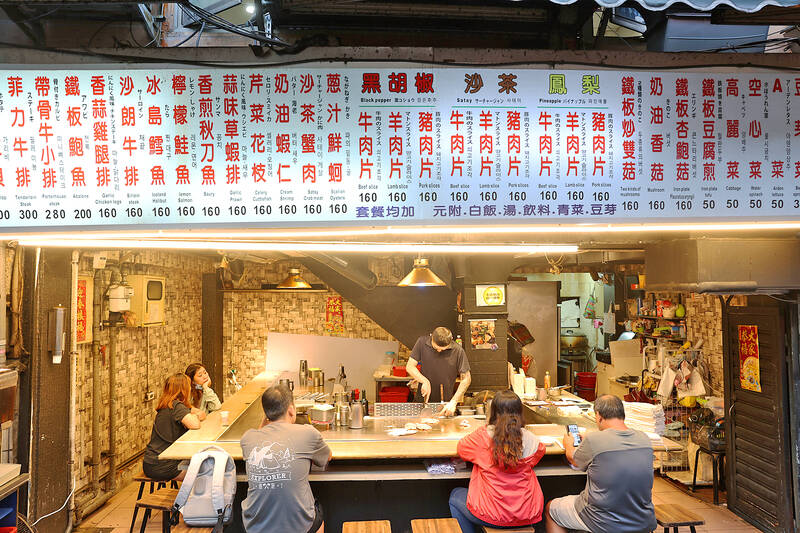The consumer price index (CPI) last month showed a 1.82 percent rise from a year earlier, the lowest in eight months and below the central bank’s 2 percent target, as food costs held relatively stable, the Directorate-General of Budget, Accounting and Statistics (DGBAS) said yesterday.
The inflationary gauge is likely to hover below the 2 percent level going forward, in the absence of major abnormal surprises, despite Typhoon Krathon earlier this month and the recent rise in international oil prices, DGBAS official Tsao Chih-hung (曹志弘) said.
“The crop damage wreacked by Typhoon Krathon is not as serious as that left by typhoons a year earlier,” Tsao said.

Photo: CNA
Food costs last month grew a moderate 3 percent, as fruit prices rose 17.37 percent, but vegetable prices decreased 4.21 percent and egg prices declined 15.49 percent, the DGBAS said.
The core CPI, a more reliable long-term price tracker because it strips out volatile items, increased 1.79 percent, virtually unchanged from one month earlier and affirming a stable consumer price trend, the statistics agency said, adding that the CPI value after seasonal adjustments gained 0.38 percent.
However, the public might still feel the pinch because dining out prices climbed 2.98 percent, rents increased 2.5 percent, and medicine and healthcare prices rose 2.61 percent from a year earlier, Tsai said.
Shelter prices also expanded 2.39 percent, attributable to more expensive home maintenance costs, as well as electricity rate hikes from April onward, while education and entertainment prices added 1.79 percent, DGBAS data showed.
The producer price index (PPI), which measures the price movements of goods from a seller’s perspective, shrank 0.33 percent year-on-year last month, owing to price corrections for international fuel, food and electronic components, the agency said.
In the first nine months of this year, the CPI grew 2.26 percent, while the PPI rose by 1.47 percent from the same period of last year, it said.

KEEPING UP: The acquisition of a cleanroom in Taiwan would enable Micron to increase production in a market where demand continues to outpace supply, a Micron official said Micron Technology Inc has signed a letter of intent to buy a fabrication site in Taiwan from Powerchip Semiconductor Manufacturing Corp (力積電) for US$1.8 billion to expand its production of memory chips. Micron would take control of the P5 site in Miaoli County’s Tongluo Township (銅鑼) and plans to ramp up DRAM production in phases after the transaction closes in the second quarter, the company said in a statement on Saturday. The acquisition includes an existing 12 inch fab cleanroom of 27,871m2 and would further position Micron to address growing global demand for memory solutions, the company said. Micron expects the transaction to

Nvidia Corp’s GB300 platform is expected to account for 70 to 80 percent of global artificial intelligence (AI) server rack shipments this year, while adoption of its next-generation Vera Rubin 200 platform is to gradually gain momentum after the third quarter of the year, TrendForce Corp (集邦科技) said. Servers based on Nvidia’s GB300 chips entered mass production last quarter and they are expected to become the mainstay models for Taiwanese server manufacturers this year, Trendforce analyst Frank Kung (龔明德) said in an interview. This year is expected to be a breakout year for AI servers based on a variety of chips, as

Global semiconductor stocks advanced yesterday, as comments by Nvidia Corp chief executive officer Jensen Huang (黃仁勳) at Davos, Switzerland, helped reinforce investor enthusiasm for artificial intelligence (AI). Samsung Electronics Co gained as much as 5 percent to an all-time high, helping drive South Korea’s benchmark KOSPI above 5,000 for the first time. That came after the Philadelphia Semiconductor Index rose more than 3 percent to a fresh record on Wednesday, with a boost from Nvidia. The gains came amid broad risk-on trade after US President Donald Trump withdrew his threat of tariffs on some European nations over backing for Greenland. Huang further

HSBC Bank Taiwan Ltd (匯豐台灣商銀) and the Taiwan High Prosecutors Office recently signed a memorandum of understanding (MOU) to enhance cooperation on the suspicious transaction analysis mechanism. This landmark agreement makes HSBC the first foreign bank in Taiwan to establish such a partnership with the High Prosecutors Office, underscoring its commitment to active anti-fraud initiatives, financial inclusion, and the “Treating Customers Fairly” principle. Through this deep public-private collaboration, both parties aim to co-create a secure financial ecosystem via early warning detection and precise fraud prevention technologies. At the signing ceremony, HSBC Taiwan CEO and head of banking Adam Chen (陳志堅)